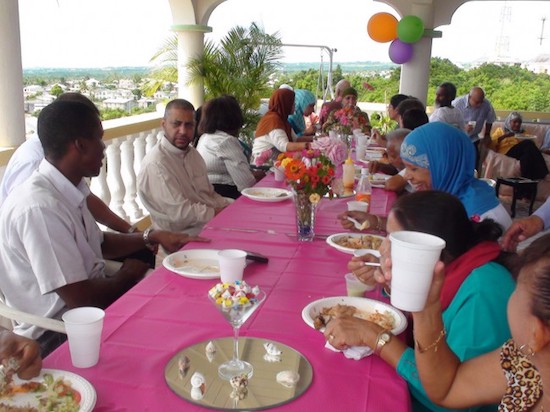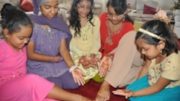They have been a part of our landscape for more than a century; yet the Muslim community remain largely an unknown element in Barbados.
This week, members of that community share their history, experiences and aspirations with Barbados TODAY, giving some insight into their Islamic religion and their love for the island.
Their religious beliefs and practices apart, Muslims in Barbados say they are as Bajan as any other Barbadian.
And, they want to be treated no other way.
Actually, if you ask the secretary of the Barbados Muslim Association, Suleiman Bulbulia, he would tell you that over the years Muslims have lived on the island freely and fellow Barbadians have been very accommodating to them –– as to those of other faiths.
If this has been the case, is it the recent dreadful international reports of Muslim extremists across the world that may now have driven fear into some non-Muslim Barbadians, triggering recent public and vocal attack on the notion of a special housing project under the leadership and management of the local Muslim community?

Author Sabir Nakhuda of the book Bengal To Barbados in which he tells of East Indians’ journey from India to the island.
“We are not asking for anything outrageous. There is no ill motive on the Muslims’ part which I can speak about –– anything that would bring any bad reputation to the country,” Bulbulia sought to assure Barbadians in an interview with Barbados TODAY, in which he and seasoned Muslim Sabir Nakhuda spoke about the integration into local society of the group, specifically those members of Indian descent.
“And we have continued to show by our commitment, and our hard work and our sacrifice, that we are there for the development of Barbados,” association secretary Bulbulia added.
A history lesson from Nakhuda, author of Bengal To Barbados; A 100-Year History Of East Indians In Barbados, showed that before the abolishment of slavery on the island there were Muslims among the slaves; but they were never allowed to practise the faith.
Subsequently, the writer said, the integration of East Indian Muslims in Barbados began in 1910 with the arrival of Bashart Ali from West Bengal, who became the first Muslim Indian to marry an Afro-Barbadian woman. Following in Ali’s footsteps, most of the Bengali men married Barbadian women, retaining their Islamic faith but being also tolerant and respectful of their wives’ and children’s wishes to continue practising Christianity.
“The husband who was a Muslim never prevented his wife from practising her faith. So, right there it shows that they integrated socially,” Bulbulia said.
In the home, the Muslim husband, in keeping with his religious rules, did not eat pork, among other meats, or consume alcohol; and these foods were not prepared in his home. His wife would eat such at her family’s house.
“But we still eat cou-cou and flying fish, and we would still have fish cakes. We blend our cuisine along with the Barbadian cuisine. We probably would use Indian spices when we are doing a particular rice and stew.
“Samosas are a dish you probably need to have when you are having a party, and that is a culinary contribution from Indians to the Barbadian culture,” Nakhuda explained.
Today, in keeping with a tradition started when Ali first arrived in Barbados, many poor Barbadians depend on Muslim salesmen, also referred to as “coolie men”, who supply them with household items on credit.
According to the author, this could be described as a form of commercial integration.
“Ali went in the countryside where black Barbadians could not even afford to leave the plantation; and, even if they could afford to leave, then they had to come into Bridgetown and pay cash for items. But Bashart Ali would leave Bridgetown and go in the countryside, to the plantation yard, and so on, and credit the Barbadians without any down payment. And then on a weekly basis he would go and collect money, whether it was ten cents or 25 cents . . . ,” author Nakhuda recalled, as he enthusiastically shared his knowledge.
During those early years of their settlement, East Indian Muslims did not live in the “heights or terraces”; they dwelt in suburban areas like Carrington’s Village, Kensington New Road, Mason Hall Street and Chapman Street –– among ordinary black Barbadians, while the upper class Bajan Whites resided in Belleville, Strathclyde andother “proclaimed posh areas”.
By 1929, Muslims from Gujarat in India started to arrive in the island, and the integration practice continued.
“If you talk about cricket, you would find the East Indian kids playing cricket together; and you would see even in the 1980s the East Indians and the Barbadians would have played together and went to tours to Trinidad and other countries,” said Nakuhda, who has worked in sales, public relations, counselling and teaching.
Can you picture a full integration between the Muslim community and the main population?
You definitely would not see a Muslim wukking up on Spring Garden Highway, because, according to Nakhuda, that is a no-no for members of his religion and those of other faiths “who believed that morality is important to their chosen way of life”.
“We will never have a total integration, because there are things that would hamper us from integrating,” Nakhuda admitted. “Religion is a very important thing for us, and there are a lot of dos and don’ts that we would not want to disobey.
“We would mix to a certain extent; and I think Barbadians need to understand too that we have our way of life. The way that the early East Indians respected the beliefs of their [Bajan] wives, I think that we would ask nothing but Barbadians understand our culture and our beliefs,” said the writer who has for many years been actively involved in various social, cultural and religious activities on the island.
Bulbulia acknowledged that Muslims participated in national events such as the National Independence Festival Of Creative Arts and multifaith events that would benefit the country but, most importantly, would not directly conflict with their teachings or their religion.
So to what extent can this group be integrated into general Barbadian society?
“In the Muslim faith, mingling between the sexes is not something that is highly recommended. So you will find that at a function, a wedding or a dinner, the women would be in one area and the men in another –– because there is no mingling –– whereas, the norm in Barbados is that if you go to a party everybody is together,” Bulbulia explained.
The Barbados Muslim Association secretary continued: “You would find Muslims don’t participate in cultural events in Barbados because of those factors such as the mingling; and in Islam we don’t have music, and we don’t have dancing and those kinds of things that happen at Crop Over. That doesn’t only apply to Muslims, because I know Seventh-Day Adventists who may not go to an event because there will be alcohol. So it is not a racial ethnic thing; it is a religious thing really.”
Some non-Muslims have also publicly commented through various media –– as well as spoken behind closed doors –– on the rate at which members of the Muslim community have acquired properties in specific areas across the island.
To this, Bulbulia said Muslims believed they, like other Barbadians, should enjoy the freedom to invest in the country, and that included ownership of properties.
“Why certain areas you might find Muslims going is because of the whole issue of being together in the vicinity of a mosque. For example, in Kensington New Road you would find a lot of Muslims because there is a mosque there. In Belleville there is a mosque, and you would find Muslims there.
“Similarly, with Cave Hill; we have had Muslims there for a number of years, and more are hoping to go there because a mosque is going to be there. Our place of worship is a focal point, and we go there five times a day if we can.
“We see ourselves as Barbadians; and, if we have the funds, we invest. Generally, we don’t waste our money on useless things, and we see investment as important.
“The other thing that is important to note is we can’t put our money in a bank to get interest. Togive or to take interest is forbidden in Islam. So, generally, when it comes to making money, we have to look for ways to make our money work for us in a manner that is allowed for us to make the money,” Bulbulia explained.
There is much more to be told about this “integration” that continues to develop and strengthen every day, but in the meantime, as that process takes place, 67-year-old Nakhuda is asking members of the main Barbadian population to understand that Muslims in Barbados are no longer outsiders and are not expected to be seen as people who came “from over and away”.
I came here when I was ten years old. So I am more Bajan than some Bajans. Look at us as Barbadians, irrespective of our religious beliefs and how we are attired,” Nakhuda urged.
“We have the same goals as any decent citizen of this country to make sure that Barbadians are well off; so that we can go forward together. Put that thing about us and them to rest forever. Amen.”





Be the first to comment on "Bajan to the bone"